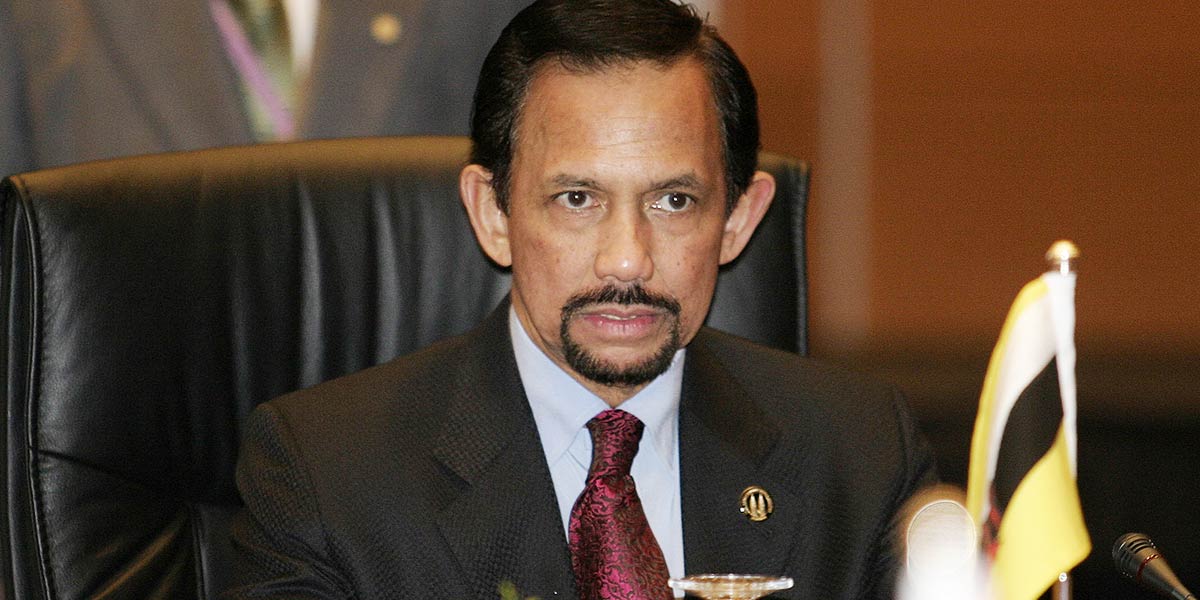Brunei hits back. Says gay execution law about “prevention” not punishment

Sultan Hassanal Bolkiah (imagemaker / Shutterstock.com)
The government of Brunei has attempted to defend its new gay execution law in a nonsensical letter to the United Nations.
In the letter to UN human rights chiefs, Brunei’s second minister of foreign affairs, Dato Erywan Yusof, said the Sharia law provisions aim to preserve the country’s “traditional, religious and cultural values.”
The kingdom’s amended Sharia penal code, which includes punishing anal sex and adultery with stoning to death, came into force last week and sparked protests and calls for a boycott of Brunei-owned businesses.
Critics have accused Brunei’s monarch, Sultan Hassanal Bolkiah, of hypocrisy in light of his own past extravagant spending, partying and womanising (including allegations of abuse). It’s also been claimed that one of his sons, Prince Abdul Azim, is himself gay.
In a remarkable example of double-speak, the Brunei government asserted in the letter that it remains committed to “its international obligations in promoting and protecting human rights as enshrined in the Charter of the United Nations and the Universal Declaration of Human Rights.”
Yusof stated that the Sharia criminal law system “focuses more on prevention than punishment” and that “its aim is to educate, deter, rehabilitate and nurture rather than to punish.”
Despite it penalising anal sex with death by stoning and lesbian sex with whipping, he bizarrely insisted that the law does “not criminalise nor has any intention to victimise a person’s status based on sexual orientation or belief, including same-sex relations.”
Yusof then wrote that, “The criminalisation of adultery and sodomy is to safeguard the sanctity of family lineage and marriage of individual Muslims particularly women” and that the offences “will not apply to non Muslims unless the act of adultery or sodomy is committed with a Muslim.”
He also specifically addressed penalties such as stoning to death and amputation, imposed for theft, robbery, adultery and sodomy.
Yusof argued that these “have extremely high evidentiary threshold, requiring no less than two or four men of high moral standing and piety as witnesses – to the exclusion of every form of circumstantial evidence, coupled with very high standard of proof of ‘no doubt at all’ for all aspects, which goes further than the common law standard of ‘beyond reasonable doubt’.”
The implication is that because it is likely to be rarely enforced, the international community should turn a blind eye to the legislation, which Human Rights Watch described as “barbaric” and “archaic.”
Meanwhile, Australia’s Prime Minister, Scott Morrison, has finally spoken out about Brunei’s revised penal code, stating that Australia is “strongly opposed to corporal and capital punishments in all circumstances and for all people, including in Brunei.”
In a letter to LGBTI activist Rodney Croome, Morrison said that “The Government’s view is clear: criminalisation of consensual same-sex sexual relationships is unacceptable. We believe in equal human rights for LGBTI persons and an end to violence and discrimination against LGBTI persons across the region and globally.”
- Facebook Messenger
- Total119
Leave a Reply